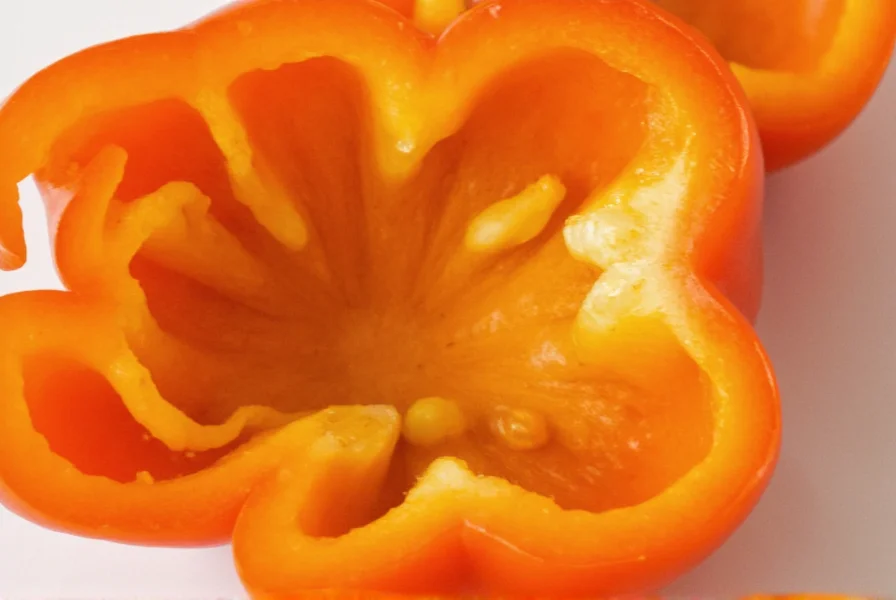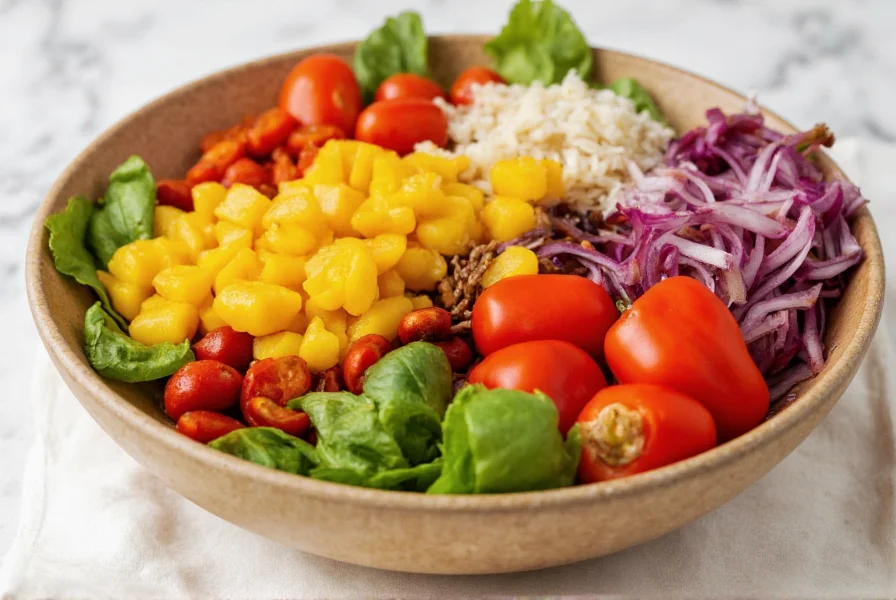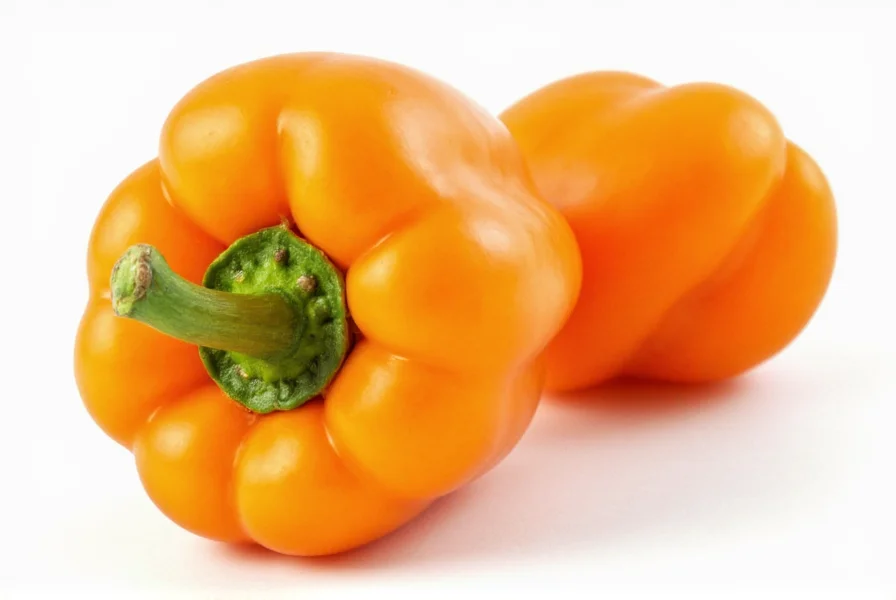Orange bell peppers represent nature's perfect package of flavor and nutrition. As they ripen longer than green peppers on the vine, they develop a sweeter taste and significantly enhanced nutritional profile. This vibrant vegetable belongs to the nightshade family and offers unique health advantages that make it a valuable addition to any balanced diet.
Nutritional Composition of Orange Peppers
Orange bell peppers contain a remarkable concentration of essential nutrients that support overall health. Their nutritional superiority over less ripe varieties stems from the additional time spent developing on the plant. Let's examine the specific nutritional components that make orange peppers stand out.
| Nutrient | Amount per 100g | Daily Value % |
|---|---|---|
| Calories | 31 | 2% |
| Carbohydrates | 6.2g | 2% |
| Dietary Fiber | 2.1g | 8% |
| Vitamin C | 128mg | 152% |
| Vitamin A | 158μg | 18% |
| Vitamin B6 | 0.3mg | 18% |
| Vitamin K1 | 4.6μg | 4% |
| Potassium | 211mg | 6% |
| Folate | 28μg | 7% |
Comparative Analysis: Orange vs. Other Bell Peppers
Understanding how orange peppers compare nutritionally to their counterparts reveals why they're worth incorporating into your diet. The ripening process significantly impacts their nutritional composition.
| Nutrient | Green Pepper | Orange Pepper | Red Pepper | Yellow Pepper |
|---|---|---|---|---|
| Vitamin C (mg) | 80 | 128 | 190 | 184 |
| Beta-Carotene (μg) | 370 | 5,170 | 7,920 | 5,930 |
| Vitamin A (IU) | 370 | 1,580 | 3,131 | 2,500 |
| Antioxidant Capacity | Low | Medium-High | Highest | High |
| Calories (per 100g) | 20 | 31 | 31 | 30 |
As shown in the comparison table, orange bell peppers offer substantially more vitamin C and beta-carotene than green peppers. While red peppers contain slightly higher amounts of certain nutrients, orange peppers provide an excellent balance of sweetness, flavor, and nutritional value. The extended ripening process converts chlorophyll to carotenoids, creating the distinctive orange color and boosting antioxidant content.
Health Benefits of Orange Pepper Nutrients
The specific nutritional composition of orange peppers translates to numerous health advantages. Let's examine how these nutrients work together to support your wellbeing.
Vitamin C Powerhouse
With 152% of your daily vitamin C needs in just 100 grams, orange peppers significantly outperform even citrus fruits in vitamin C concentration. This potent antioxidant:
- Strengthens immune function by supporting white blood cell production
- Enhances iron absorption from plant-based foods
- Promotes collagen synthesis for healthy skin and connective tissues
- Protects cells from oxidative damage that contributes to chronic disease
Beta-Carotene and Eye Health
Orange peppers contain substantial beta-carotene, which your body converts to vitamin A. This nutrient combination:
- Supports healthy vision and may reduce risk of age-related macular degeneration
- Maintains healthy mucous membranes in respiratory and digestive tracts
- Acts as an antioxidant to protect cells from free radical damage
- Contributes to healthy skin cell development and repair
Fiber Content and Digestive Health
The dietary fiber in orange peppers (2.1g per 100g) provides multiple digestive benefits:
- Promotes regular bowel movements and prevents constipation
- Supports a healthy gut microbiome by feeding beneficial bacteria
- Helps regulate blood sugar levels by slowing carbohydrate absorption
- Contributes to feelings of fullness, supporting healthy weight management
Practical Applications: Maximizing Nutritional Benefits
To fully leverage the nutritional value of orange peppers, consider these evidence-based recommendations for selection, storage, and preparation.
Selection and Storage Techniques
Choose firm, glossy peppers with smooth skin and deep color. Avoid those with wrinkles, soft spots, or discoloration. For maximum freshness:
- Store unwashed peppers in the crisper drawer of your refrigerator
- Keep them in a plastic bag with small ventilation holes
- Consume within 1-2 weeks for optimal nutrient retention
- Never store peppers near ethylene-producing fruits like bananas or apples
Culinary Preparation Methods
How you prepare orange peppers affects their nutritional availability:
- Raw consumption preserves maximum vitamin C content
- Light cooking (steaming or stir-frying) enhances beta-carotene absorption
- Pair with healthy fats (like olive oil) to improve absorption of fat-soluble vitamins
- Avoid overcooking, which can degrade heat-sensitive nutrients

Orange Peppers in a Balanced Diet
Incorporating orange peppers into your regular meal planning offers versatile nutritional benefits. Consider these practical suggestions:
- Add sliced peppers to morning omelets or frittatas for a vitamin-rich breakfast
- Include in salads for crunch and nutrient density without excess calories
- Blend into smoothies for natural sweetness and added nutrients
- Stuff with lean proteins and whole grains for a complete meal
- Roast with other vegetables as a flavorful side dish
For those following specific dietary patterns, orange peppers fit well into Mediterranean, plant-based, low-carb, and heart-healthy eating approaches. Their natural sweetness makes them particularly appealing for introducing more vegetables to children's diets.

Frequently Asked Questions
How does the vitamin C content in orange peppers compare to other common sources?
Orange bell peppers contain approximately 128mg of vitamin C per 100g, which is significantly higher than oranges (53mg per 100g) and substantially more than green peppers (80mg per 100g). Only red peppers (190mg per 100g) and yellow peppers (184mg per 100g) contain more vitamin C among common bell pepper varieties.
Are cooked orange peppers less nutritious than raw ones?
Cooking affects different nutrients in varying ways. Vitamin C decreases with heat exposure, so raw orange peppers provide maximum vitamin C. However, cooking actually increases the bioavailability of carotenoids like beta-carotene. Light cooking methods like steaming or quick stir-frying offer the best balance, preserving most nutrients while enhancing absorption of certain compounds.
Can orange peppers help with weight management?
Yes, orange peppers can support weight management efforts. With only 31 calories per 100g and 2.1g of fiber, they provide substantial volume and nutrients with minimal calories. The fiber content promotes satiety, helping you feel full longer. Their natural sweetness can satisfy sugar cravings while providing essential nutrients, making them an excellent addition to weight-conscious meal plans.
How do orange peppers benefit skin health specifically?
Orange peppers support skin health through multiple mechanisms. The high vitamin C content is essential for collagen production, which maintains skin elasticity and firmness. Beta-carotene converts to vitamin A, promoting healthy skin cell turnover. The antioxidants protect against free radical damage from UV exposure and pollution. Additionally, the hydration from their high water content (92%) helps maintain skin moisture balance.
Are there any potential downsides to consuming orange peppers?
Orange peppers are generally safe for most people when consumed in normal food amounts. However, those with nightshade sensitivities may experience digestive discomfort. The high vitamin K content could potentially interact with blood-thinning medications, so individuals on such medications should maintain consistent intake rather than varying dramatically. As with any food, excessive consumption could lead to digestive upset in sensitive individuals.











 浙公网安备
33010002000092号
浙公网安备
33010002000092号 浙B2-20120091-4
浙B2-20120091-4